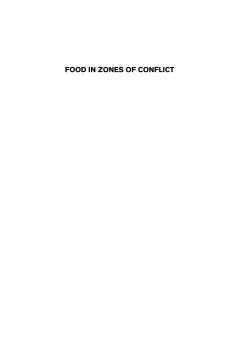
Additional Information
Book Details
Abstract
The availability of food is an especially significant issue in zones of conflict because conflict nearly always impinges on the production and the distribution of food, and causes increased competition for food, land and resources Controlling the production of and access to food can also be used as a weapon by protagonists in conflict. The logistics of supply of food to military personnel operating in conflict zones is another important issue. These themes unite this collection, the chapters of which span different geographic areas. This volume will appeal to scholars in a number of different disciplines, including anthropology, nutrition, political science, development studies and international relations, as well as practitioners working in the private and public sectors, who are currently concerned with food-related issues in the field.
Paul Collinson is an Honorary Research Associate and former part-time lecturer in the Department of Anthropology at Oxford Brookes University. He also works for the UK government. As well as the anthropology of food, his research interests include the anthropology of development and applied anthropology. His research is focused on the Republic of Ireland where he has been conducting anthropological fieldwork since the late 1990s.
Helen Macbeth is a former President of the International Commission on the Anthropology of Food and Nutrition and is an Honorary Research Fellow in Anthropology, Oxford Brookes University. Her main academic interest is in fostering cooperation between biological and social scientists. She has previously edited or co-edited seven volumes, four of which are in this series.
WINNER OF THE 2014 GOURMAND WORLD COOKBOOK UK AWARD
“The strength of this edited collection lies in the breadth of case-studies from different parts of the world. Employing methodologies based both on ethnographic fieldwork and historical sources, these chapters effectively demonstrate the diligent work required in order to explore the ongoing conflicts taking place on the global stage… this book successfully illustrates an under-recognized relationship between warfare and food.” • Journal of the Royal Anthropological Institute (JRAI)
“One of the most prevalent themes of this innovative collection is the exploration of how food becomes highly politicized and used as a political and military weapon, with multiple chapters examining—and convincingly demonstrating—how governments and other powerful groups exploit the availability of and access to food… a valuable contribution to an often overlooked and underexplored topic, which also offers innovative and novel case studies and empirical data to the more well-trodden tropes of food security and poverty, nutrition and intervention. It is sure to find its way onto many reading lists and will provide a useful resource for undergraduate and graduate teaching and research.” • Food, Culture & Society
“The novelty of the volume lies in the breadth of perspectives from which the relationships between armed conflict, food security, poverty, politics, globalization, and culture are examined… Overall, this volume makes a unique contribution with evidence from multidisciplinary perspectives of the myriad complexities surrounding food in zones of conflict….the chapters do an excellent job of providing adequate context for the lay reader to situate the respective case studies. For this reason, the book would be an excellent choice for introductory and intermediate studies. This volume would also serve as a crucial resource for policy makers, advocates, and teachers around the world, providing evidence of the direct links between hunger, poverty, and death resulting from war.” • Journal of Anthropological Research
Table of Contents
| Section Title | Page | Action | Price |
|---|---|---|---|
| Title page | iii | ||
| Copyright | iv | ||
| Contents | v | ||
| List of Figures | vii | ||
| List Of Tables | ix | ||
| Foreword | x | ||
| Preface | xii | ||
| List of Contributors | xiv | ||
| Introduction | 1 | ||
| Chapter 1 ‘TRY TO IMAGINE, WE DIDN’T EVEN HAVE SALT TO COOK WITH!’: FOOD AND WAR IN SIERRA LEONE | 27 | ||
| Chapter 2 LANDMINES, CLUSTER BOMBS AND FOOD INSECURITY IN AFRICA | 39 | ||
| Chapter 3 SPECIAL NUTRITIONAL NEEDS IN REFUGEE CAMPS: A CROSS-DISCIPLINARY APPROACH | 53 | ||
| Chapter 4 PATTERNS OF HOUSEHOLD FOOD CONSUMPTION IN CONFLICT AFFECTED HOUSEHOLDS IN TRINCOMALEE, SRI LANKA | 65 | ||
| Chapter 5 ENGAGING RELIGION IN THE QUEST FOR SUSTAINABLE FOOD SECURITY IN ZONES OF CONFLICT IN SUB-SAHARAN AFRICA | 77 | ||
| Chapter 6 LIVESTOCK PRODUCTION IN ZONES OF CONFLICT IN THE NORTHERN BORDER OF MEXICO | 85 | ||
| Chapter 7 THE LOGIC OF WAR AND WARTIME MEALS | 95 | ||
| Chapter 8 NUTRITION, FOOD RATIONING AND HOME PRODUCTION IN THE UK DURING THE SECOND WORLD WAR | 107 | ||
| Chapter 9 BEYOND THE RATION: ALTERNATIVES TO THE RATION FOR BRITISH SOLDIERS ON THE WESTERN FRONT, 1914–1918 | 123 | ||
| Chapter 10 SUSTAINING AND COMFORTING THE TROOPS IN THE PACIFIC WAR | 133 | ||
| Chapter 11 ENEMY CUISINE: CLAIMING AGENCY, SEEKING HUMANITY AND RENEGOTIATING IDENTITY THROUGH CONSUMPTION | 145 | ||
| Chapter 12 THE MEMORY OF FOOD PROBLEMS AT THE END OF THE FIRST WORLD WAR IN SUBSEQUENT PROPAGANDA POSTERS IN GERMANY | 155 | ||
| Chapter 13 ECHOES OF CATASTROPHE: FAMINE, CONFLICT AND RECONCILIATION IN THE IRISH BORDERLANDS | 171 | ||
| Chapter 14 ‘LAND TO THE TILLER’: HUNGER AND THE END OF MONARCHY IN ETHIOPIA | 185 | ||
| Chapter 15 PROSPECTS FOR CONFLICT TO SPREAD THROUGH BILATERAL LAND ARRANGEMENTS FOR FOOD SECURITY | 197 | ||
| Chapter 16 FOOD, CONFLICT AND HUMAN RIGHTS: ACCOUNTING FOR STRUCTURAL VIOLENCE | 209 | ||
| Index | 225 |
